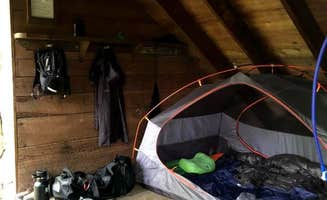Primitive camping sites dot the woodlands surrounding Waterford, Pennsylvania, particularly in the Allegheny National Forest region. Dispersed camping options range from boat-access islands to rustic clearings in state forests. Most sites sit at elevations between 1,200 and 1,600 feet, with summer temperatures averaging 75-85°F during peak camping season.
What to do
Paddle to private islands: Access unique camping at Private Island w/ Paddle Moor Co. where maintained trails connect campsites. "The island has cleared trails to get to the campsite which seem to be maintained very well and on a regular basis," notes Jessica Z., who also mentioned the spectacular natural light show: "When it was dark (pitch black) you could see all the fireflies. To be honest that was like a show in itself."
Winter camping options: Experience cold-weather camping at dedicated shelters in the region. The shelters provide winter protection while maintaining the outdoor experience. Snow-covered trails often remain accessible for pulling supplies on sleds, though visitors should bring appropriate cold-weather gear and extra kindling for fires.
River exploration: Camp near the Allegheny Wild and Scenic River for easy water access. Visitors note the "large sites well shaded" along the river corridor. Many riverside campsites offer direct water access for fishing, swimming, and paddling opportunities.
What campers like
Adirondack shelters: The raised timber platforms with slanted roofs and stone fireplaces provide comfortable alternatives to tent camping. Shelters include practical features for extended stays, with hooks for hanging equipment and built-in storage options.
Private site placement: Campers appreciate thoughtful site design that creates privacy between camping areas. Sites positioned to face the forest rather than neighboring campers create a more secluded wilderness experience even in established camping areas.
Seasonal wildlife viewing: Compass Campgrounds offers "tons of trails so you can explore the area and search for local wildlife," according to Jake C. Many campgrounds in the region provide opportunities for wildlife observation, particularly during morning and evening hours.
What you should know
Primitive site conditions: Many dispersed camping areas have minimal amenities. At Warner Road Dispersed Camping, Rose S. reports finding "a fire pit, primitive spot so no services." Visitors should verify if overnight camping is permitted, as Denise D. noted "there are posted signs that say Day Use Only" at some locations.
Variable access requirements: Some sites require 4WD vehicles, especially after rain. At Big Oak Hill, a reviewer noted "the campsite is accessible by drive-in, but you may need a 4-wheel drive vehicle if there has been rain." Contact rangers or campground hosts for current conditions before arrival.
Pack-in/pack-out responsibilities: Most primitive sites lack trash service. Multiple reviewers mention litter problems at dispersed sites, indicating the importance of proper waste management. Bring extra bags for removing all trash from your campsite.
Tips for camping with families
Cabin alternatives: For families seeking more protection from elements, consider shelters or cabins. Higby's Campground & Cottages offers cottage accommodations alongside traditional tent sites, providing weather protection while maintaining the camping experience.
Site selection strategies: Choose campsites with natural boundaries to contain children. Sites near shallow creek sections allow for supervised water play while maintaining safety. Established campgrounds typically offer more amenities for families than dispersed sites.
Seasonal considerations: Plan family camping between late May and early October when facilities are fully operational. Crystal Springs Campground operates seasonally "May 1 to October 15," representing the typical camping season for the region. Spring visits often encounter muddy conditions, while fall camping requires warmer sleeping bags.
Tips from RVers
Access limitations: Most primitive camping areas near Waterford cannot accommodate larger RVs or trailers. Verify road conditions and turning radius requirements before attempting access with any recreational vehicle. Established campgrounds offer more reliable RV access.
Limited hookups: Even at French Creek Flood Plain Overlook, where tent camping is popular, hookups are not available. RVers should plan to boondock without water, electric or sewer connections at most natural sites. Bring sufficient water supplies and plan for battery or generator power.
Seasonal road closures: Winter access becomes difficult or impossible for RVs on many forest roads. Spring thaw conditions often create impassable mud sections on unpaved access roads. Call ahead to verify current conditions before attempting RV access to remote sites.



